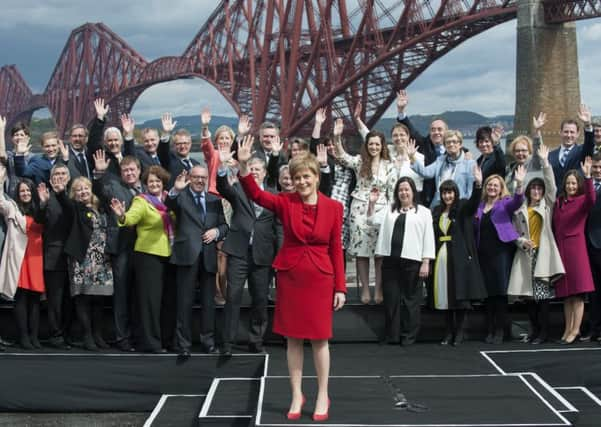Leader comment: SNP can afford a gamble on taxes


As Benjamin Franklin’s famous aphorism goes, there is nothing certain in life except for death and taxes.
But perhaps the list could be extended to include government ministers failing to stick their necks out in the run-up to elections.
Advertisement
Hide AdAdvertisement
Hide AdThe Scottish Parliament’s new tax-raising powers have opened up not only a fascinating debate about how we fund our public services, but also a new fault line between Labour and the SNP.
Labour leader Kezia Dugdale’s calculated gamble to increase income tax in Scotland to 1p above the UK rate sems to have caught finance minister John Swinney on the hop.
Yesterday he told MSPs at Holyrood that he would not “punish” Scotland’s lowest-paid workers with a tax rise.
His stance is no great shock with an election just a few short months away.
But with the polls predicting the SNP will hang on to their majority at Holyrood, perhaps now is the time for the party to show a little more ambition.
Both Labour and the Lib Dems say the tax rise is necessary to help provide almost £500 million of additional funding for education.
Local authority body Cosla has complained it is facing “totally unacceptable” cuts totalling £350m.
Councils have until 9 February to sign up to a financial package which includes a continuation of the council-tax freeze, investment in integrating health and social care and a commitment to maintain the pupil-to-teacher ratio in schools. Members of trade unions Unite and GMB Scotland were among those gathered outside the Scottish Parliament to protest against the settlement ahead of yesterday’s budget debate.
Advertisement
Hide AdAdvertisement
Hide AdThe tax pledge is a risk for Labour, but one worth taking for a party which can’t really slump any further.
The party has promised a £100 rebate for the country’s lowest earners, something Mr Swinney described yesterday a “back-of-the-fag-packet” policy.
With the Scottish rate of income tax due to come into effect from 6 April, Mr Swinney has pledged to keep payments in line with the rest of the UK.
There was plenty of talk from the SNP in the run-up to 2014’s independence referendum on shaping Scotland’s destiny.
There were fine words about lifting children out of poverty and reducing the attainment gap in our schools.
But presented with an opportunity to use the fiscal levers now at its disposal, the SNP are playing politics.
If there was ever a party which could afford to be ambitious in the run-up to an election, it is the SNP.
Whether Ms Dugdale’s tax pledge works or spectacularly backfires, her party is unlikely to be forming the next government.
Advertisement
Hide AdAdvertisement
Hide AdBut Labour, the Lib Dems and the Tories have opened up a welcome debate on tax and how we fund the sort of Scotland we all want. At present, Mr Swinney is short-circuiting that debate.
Funeral costs need urgent action
Just as the cost of living continues to grow, it appears the cost of dying is also putting real pressure on families.
According to a report by Citizens Advice Scotland and John Birrell, chair of the Scottish Working Group on Funeral Poverty, the average cost of a funeral now sits at £3,500. The charity has warned that around one in ten people now struggles to pay the cost of a loved one’s funeral, leaving them to borrow money from a bank or credit union, arrange a short-term loan, sell personal items or collect cash from family and friends.
Some are even turning to the internet, using “crowd funding” websites to help pay the cost.
The warnings came as the Scottish Government prepares to host the first national conference to tackle funeral poverty.
The report calls on the government to change the law so that local authorities must justify any above-inflation increases to burial and cremation costs.
Another recommendation is for a Scottish Funeral Bond to be established, which would standardise costs for a simple service, and allow more people to save for their own funeral.
It all adds to the argument that undertakers be regulated and licensed.
Advertisement
Hide AdAdvertisement
Hide AdMSPs have described the absence of a licensing scheme from a bill seeking to modernise burial and cremation services as a “missed opportunity”.
With one in every 30 funerals in Scotland now resulting in someone seeking advice from Citizens Advice, it is surely time to act.
Families already saddled with the grief of losing a loved one should not be struggling with the financial burden of their funeral.